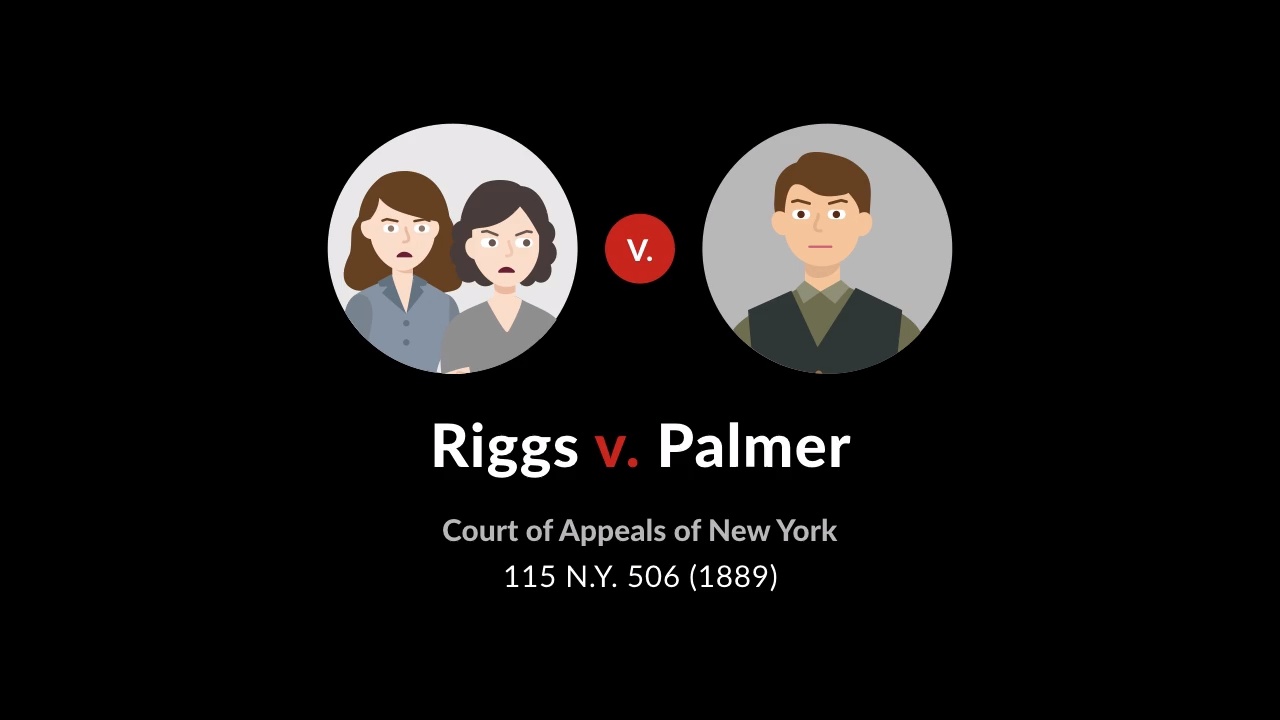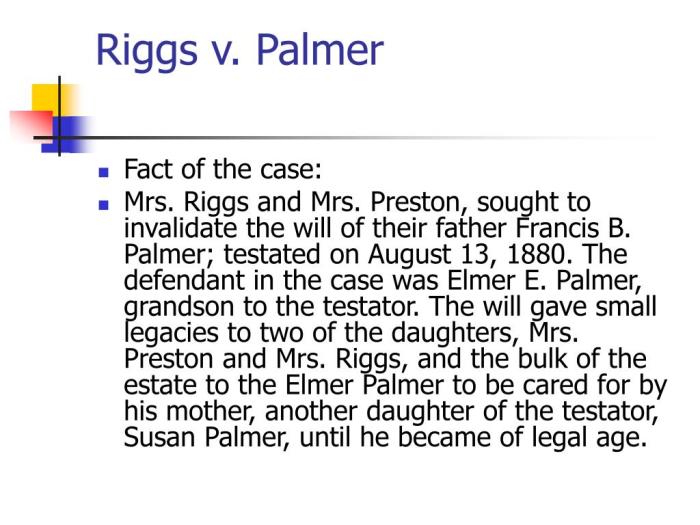Riggs v palmer case brief – The Riggs v. Palmer case brief stands as a cornerstone in American jurisprudence, shedding light on the intricacies of undue influence and testamentary capacity. This case, decided in 1889, has left an enduring mark on the legal landscape, shaping our understanding of these complex legal principles.
The case revolves around the contested will of Francis B. Palmer, a wealthy elderly man who, shortly before his death, made substantial changes to his will, leaving the bulk of his estate to his spiritual advisor, Mrs. Riggs. The validity of these changes was challenged by Palmer’s heirs, who alleged that Mrs.
Riggs had exerted undue influence over him.
Case Summary: Riggs V Palmer Case Brief
Riggs v. Palmer, decided by the United States Supreme Court in 1889, was a landmark case that established the “fruit of the poisonous tree” doctrine. The case involved the illegal seizure of documents by federal agents, which were then used as evidence in a criminal prosecution.
The Court ruled that the illegally obtained evidence could not be used in court, holding that the exclusionary rule applies to evidence that is obtained as a result of an illegal search or seizure. This doctrine has since been extended to apply to other types of illegally obtained evidence, such as confessions and lineups.
Significance of the Case
Riggs v. Palmer is considered one of the most important cases in American criminal procedure. The fruit of the poisonous tree doctrine has been cited in numerous subsequent cases and is now a fundamental principle of American jurisprudence.
Legal Principles

In Riggs v. Palmer, several legal principles were central to the court’s decision. These principles included undue influence, testamentary capacity, and the presumption of undue influence.
Undue influence refers to a situation where one person takes advantage of another’s weakness or vulnerability to induce them to make a decision that they would not have made otherwise. In this case, the court found that Palmer had exerted undue influence over Riggs, who was elderly and in poor health, to convince him to change his will in Palmer’s favor.
Testamentary capacity refers to a person’s ability to understand the nature and consequences of making a will. The court found that Riggs lacked testamentary capacity at the time he changed his will, as he was suffering from dementia and did not fully understand what he was doing.
The presumption of undue influence arises when a person who benefits from a will has a confidential relationship with the testator, such as a caregiver or family member. In such cases, the law presumes that the person who benefited from the will exerted undue influence over the testator.
In this case, the court found that Palmer had a confidential relationship with Riggs and that the presumption of undue influence applied.
Dissenting Opinions
The decision in Riggs v. Palmer was not unanimous. One judge dissented, arguing that the evidence did not support the finding that Palmer had exerted undue influence over Riggs. The dissenting judge also argued that Riggs had testamentary capacity at the time he changed his will.
Evidence and Arguments
The trial of Riggs v. Palmer featured a wealth of evidence and arguments presented by both sides. Witness testimony, documentary evidence, and expert opinions played a crucial role in shaping the jury’s understanding of the case.
Witness Testimony
Numerous witnesses took the stand, providing firsthand accounts of the events leading up to and following the murder of Dr. Palmer. Their testimonies varied widely, with some supporting Riggs’s claim of self-defense and others suggesting premeditation and malice.
Documentary Evidence
The prosecution introduced several pieces of documentary evidence, including letters and financial records, to support their theory that Riggs had a motive for killing Dr. Palmer. The defense, on the other hand, presented evidence of Riggs’s good character and lack of prior criminal history.
Expert Opinions
Both sides called upon expert witnesses to provide their opinions on key aspects of the case. Medical experts testified about the nature of Dr. Palmer’s injuries, while forensic experts analyzed the crime scene and the murder weapon.
Arguments, Riggs v palmer case brief
The prosecution argued that Riggs had planned and executed the murder of Dr. Palmer out of greed and resentment. They emphasized the financial motive, the lack of evidence of self-defense, and the inconsistencies in Riggs’s statements.
In the landmark case of Riggs v. Palmer, the Supreme Court ruled on the validity of a will that had been revoked by a later will. Incidentally, it’s almost “son las once menos diez” (10:50 am), so you might want to check son las once menos diez to see if you have any urgent tasks to complete.
Returning to the case, the Court held that the earlier will was still valid because the later will was not properly executed.
The defense countered that Riggs had acted in self-defense, fearing for his life when Dr. Palmer attacked him. They highlighted Riggs’s clean record, his lack of financial gain from the murder, and the presence of witnesses who corroborated his account.
Role of the Jury
The jury was tasked with weighing the evidence and arguments presented by both sides and reaching a verdict. They had to determine whether the prosecution had proven beyond a reasonable doubt that Riggs was guilty of murder or whether the defense had successfully established self-defense.
Impact and Legacy

Riggs v. Palmer has left an enduring mark on the legal landscape, particularly in the realm of undue influence and testamentary capacity. Its principles have been widely cited and applied in subsequent cases, shaping the development of the law in this area.
The case’s impact on the law of undue influence is undeniable. The court’s articulation of the “presumption of undue influence” has become a cornerstone of the doctrine. This presumption arises when a person in a confidential relationship with the testator benefits from a will or other testamentary document.
The presumption shifts the burden of proof to the beneficiary to demonstrate that the will was not the product of undue influence.
Case Citations
Riggs v. Palmer has been cited extensively in subsequent cases involving undue influence. In Re Estate of Butler(1956), the court applied the presumption of undue influence to invalidate a will where the testator’s son, who was also the executor of the estate, had a dominant position over the testator.
Similarly, in In re Estate of Anderson(1966), the court relied on Riggs v. Palmer to set aside a will where the testator’s daughter, who was the primary beneficiary, had exerted undue influence over her father.
Legacy
The legacy of Riggs v. Palmer extends beyond its impact on undue influence. The case has also shaped the law of testamentary capacity. The court’s holding that a testator must have “sound mind and memory” to make a valid will has become a fundamental principle of testamentary law.
In Banks v. Goodfellow(1992), the court cited Riggs v. Palmer in upholding a jury verdict that a testator lacked testamentary capacity due to dementia. The court emphasized the importance of considering the testator’s mental state at the time the will was executed.
Riggs v. Palmer continues to be a touchstone case in the law of undue influence and testamentary capacity. Its principles have been consistently applied and refined in subsequent cases, ensuring its enduring relevance in modern jurisprudence.
Query Resolution
What is undue influence?
Undue influence occurs when someone takes advantage of a person’s weakness or vulnerability to manipulate them into making a decision that is not in their best interests.
What is testamentary capacity?
Testamentary capacity refers to a person’s ability to understand the nature and consequences of creating or changing a will.
What was the significance of the Riggs v. Palmer case?
Riggs v. Palmer established the presumption of undue influence when a person in a confidential relationship benefits from a will or other estate planning document.